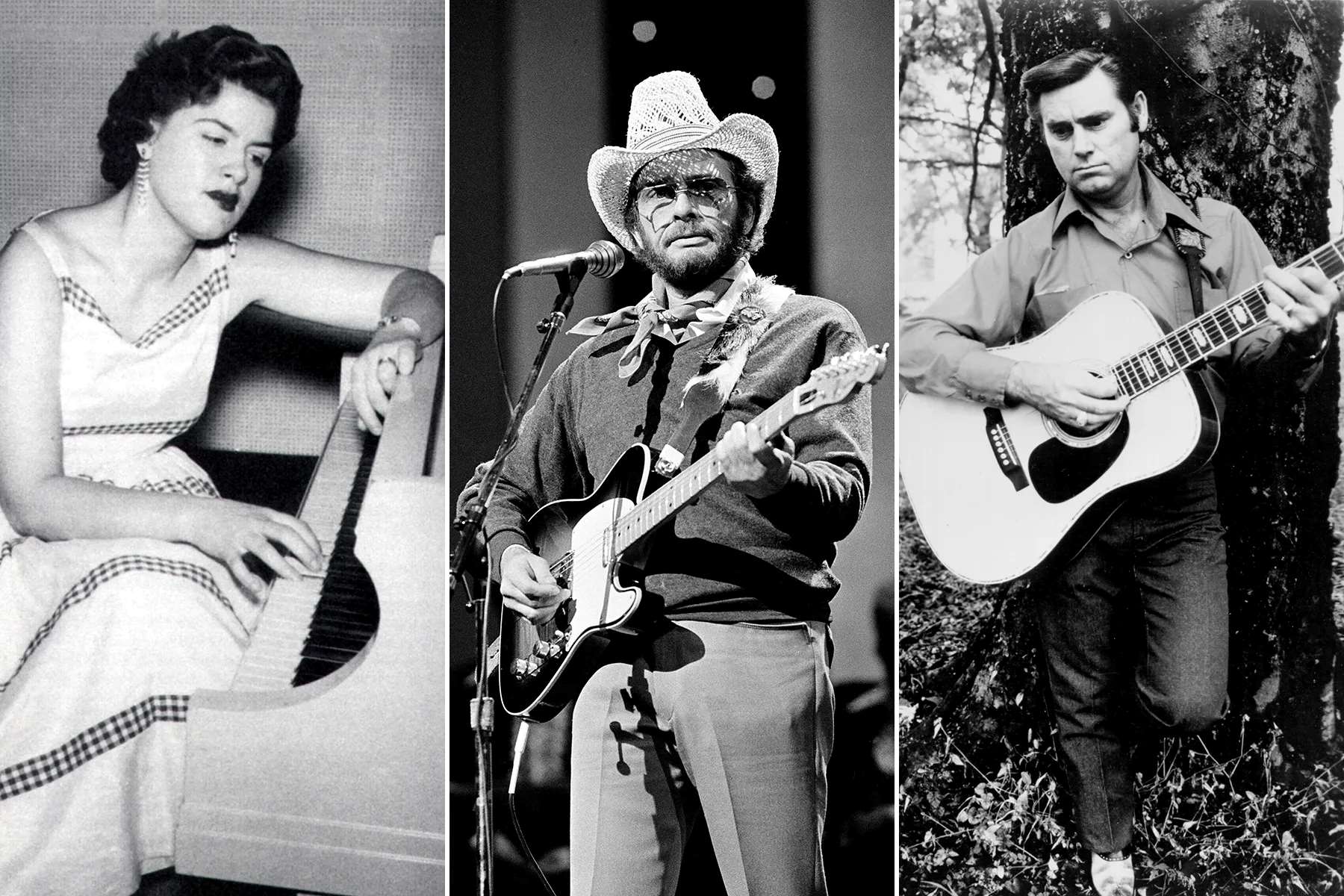Home>Music>10 Heartbreaking Rock And Rap Songs That Will Leave You In Tears


Music
10 Heartbreaking Rock And Rap Songs That Will Leave You In Tears
Published: January 11, 2024
Discover the most heart-wrenching rock and rap songs that will bring you to tears. Explore the emotional power of music with these powerful tracks.
(Many of the links in this article redirect to a specific reviewed product. Your purchase of these products through affiliate links helps to generate commission for Regretless.com, at no extra cost. Learn more)
Table of Contents
"Hurt" by Johnny Cash
Johnny Cash's haunting cover of "Hurt" is a poignant and emotionally charged rendition that delves deep into the human experience. The song, originally written and performed by Trent Reznor of Nine Inch Nails, takes on new meaning in Cash's hands, as he infuses it with his own life experiences and the wisdom of his later years.
The opening notes of the song immediately set a somber tone, drawing listeners into the raw and vulnerable world that Cash creates. His weathered voice carries the weight of a lifetime as he sings about pain, regret, and the passage of time. The lyrics, coupled with Cash's emotive delivery, resonate with anyone who has experienced loss or struggled with inner demons.
As the song progresses, Cash's introspective journey becomes increasingly palpable. The haunting line, "I hurt myself today, to see if I still feel," reverberates with a sense of self-reflection and the complexities of human emotion. The accompanying music video, which features poignant footage from Cash's own life, adds another layer of depth to the song, amplifying its emotional impact.
One of the most striking aspects of Cash's interpretation is the sense of vulnerability and authenticity that permeates every note. His gravelly voice carries a sense of world-weariness that is impossible to feign, drawing listeners into the depths of his emotional landscape. This authenticity, coupled with the song's universal themes of pain and resilience, has cemented "Hurt" as a timeless classic that continues to resonate with audiences across generations.
In the end, Johnny Cash's rendition of "Hurt" stands as a testament to the power of music to convey the depth of human experience. It is a haunting and deeply moving exploration of pain, regret, and the enduring human spirit, and it remains a poignant reminder of Cash's unparalleled ability to connect with listeners on a profound emotional level.
"Stan" by Eminem
Eminem's "Stan" is a masterful narrative-driven song that delves into the complexities of obsession, mental health, and the consequences of unchecked emotions. The track, released in 2000 as part of his album "The Marshall Mathers LP," showcases Eminem's storytelling prowess and his ability to craft a deeply compelling and emotionally charged piece of music.
The song's title character, Stan, is portrayed as an overzealous fan whose infatuation with Eminem escalates to a dangerous and ultimately tragic level. Through a series of letters addressed to the rapper, Stan's descent into desperation and madness unfolds, drawing listeners into a harrowing tale of unrequited admiration and psychological unraveling.
Eminem's lyrical prowess shines as he inhabits the personas of both Stan and himself, creating a powerful dichotomy that drives the narrative forward. The haunting chorus, featuring Dido's ethereal vocals, adds a haunting layer to the song, emphasizing the emotional intensity of Stan's plight.
As the song progresses, the tension mounts, culminating in a shocking and gut-wrenching finale that leaves a lasting impact. Eminem's ability to evoke empathy for a character as troubled as Stan is a testament to his storytelling skills and his willingness to explore dark and uncomfortable themes.
"Stan" transcends the confines of traditional music, functioning more as a gripping audio drama that unfolds over the course of its runtime. The song's impact extends beyond its musical merits, sparking conversations about the consequences of unchecked celebrity worship and the importance of mental health awareness.
In the end, "Stan" stands as a testament to Eminem's ability to craft deeply affecting narratives that resonate with listeners on a profound level. Its enduring relevance and emotional potency solidify its status as a standout in the realm of storytelling through music, leaving an indelible mark on the landscape of contemporary rap and popular culture.
"The Drugs Don't Work" by The Verve
"The Drugs Don't Work" by The Verve stands as a poignant and introspective exploration of loss, longing, and the ephemeral nature of life. Released in 1997 as part of the album "Urban Hymns," the song resonated deeply with audiences, capturing the universal experience of grappling with mortality and the emotional toll of watching a loved one slip away.
From the opening notes, the melancholic melody sets a contemplative tone, drawing listeners into the raw vulnerability of the song. Richard Ashcroft's soulful vocals infuse each line with a sense of profound sorrow, conveying the weight of impending loss and the futility of seeking solace in external remedies.
The lyrics, steeped in poignant introspection, reflect the emotional turmoil of witnessing a loved one's health deteriorate. The refrain, "The drugs don't work, they just make you worse, but I know I'll see your face again," encapsulates the bittersweet resignation of coming to terms with the inevitable while clinging to the hope of reunion beyond the confines of earthly existence.
The Verve's masterful instrumentation complements the song's lyrical depth, with sweeping orchestral arrangements adding a layer of emotional richness. The interplay of acoustic guitar and strings creates a haunting soundscape that mirrors the complexities of human emotion, evoking a profound sense of empathy and introspection.
"The Drugs Don't Work" transcends its musical composition, serving as a poignant meditation on the fragility of life and the enduring power of love and memory. Its universal themes have resonated with audiences across generations, offering solace and understanding to those grappling with the complexities of grief and loss.
In the end, The Verve's "The Drugs Don't Work" stands as a timeless testament to the human experience, capturing the essence of love, loss, and the enduring hope for reunion in the face of mortality. It remains a poignant reminder of the band's ability to evoke profound emotional resonance through their music, leaving an indelible mark on the hearts of listeners worldwide.
"Cancer" by My Chemical Romance
My Chemical Romance's "Cancer" stands as a haunting and deeply emotive exploration of the harrowing impact of the disease. Released as part of the album "The Black Parade," the song delves into the raw and complex emotions surrounding mortality, loss, and the profound sense of helplessness that often accompanies a battle with cancer.
From the opening notes, a sense of melancholy pervades the song, drawing listeners into a world of profound introspection and emotional vulnerability. Gerard Way's evocative vocals infuse each line with a palpable sense of anguish and resignation, capturing the tumultuous emotional journey of confronting mortality.
The lyrics, steeped in poignant introspection, offer a poignant portrayal of the psychological and emotional toll of cancer. Lines such as "Cause the hardest part of this is leaving you" and "If you could get me a drink of water 'cause my lips are chapped and faded" convey a sense of profound longing and the stark reality of physical and emotional deterioration.
My Chemical Romance's masterful instrumentation adds a layer of depth and emotional resonance to the song. The haunting melody, coupled with the orchestral arrangements, creates a soundscape that mirrors the complexities of human emotion, evoking a profound sense of empathy and introspection.
"Cancer" transcends its musical composition, serving as a poignant meditation on the fragility of life and the enduring power of love and memory. Its universal themes have resonated with audiences across generations, offering solace and understanding to those grappling with the complexities of grief and loss.
In the end, My Chemical Romance's "Cancer" stands as a timeless testament to the human experience, capturing the essence of love, loss, and the enduring hope for solace in the face of mortality. It remains a poignant reminder of the band's ability to evoke profound emotional resonance through their music, leaving an indelible mark on the hearts of listeners worldwide.
"Landslide" by Fleetwood Mac
Fleetwood Mac's "Landslide" stands as a timeless anthem of introspection and self-discovery, capturing the essence of personal evolution and the passage of time. Released in 1975 as part of the band's self-titled album, the song resonates with audiences across generations, offering a poignant reflection on life's transient nature and the resilience of the human spirit.
The song opens with delicate acoustic guitar chords that set a contemplative tone, immediately drawing listeners into the introspective journey that unfolds. Stevie Nicks' evocative vocals infuse each line with a sense of vulnerability and wisdom, conveying the emotional depth of the lyrics. As the song progresses, Nicks' introspective exploration becomes increasingly palpable, resonating with anyone who has grappled with uncertainty and change.
The lyrics of "Landslide" encapsulate the universal experience of grappling with life's inevitable shifts and the emotional complexities that accompany personal growth. Lines such as "I've been afraid of changing, 'cause I've built my life around you" and "Well, I've been afraid of changing, 'cause I've built my life around you" evoke a profound sense of introspection and the bittersweet realization of evolving beyond familiar comforts.
Fleetwood Mac's masterful instrumentation complements the song's lyrical depth, with the interplay of acoustic guitar and gentle percussion creating a melodic backdrop that mirrors the complexities of human emotion. The song's gradual crescendo and Nicks' emotive delivery build to a poignant climax, capturing the essence of resilience and self-discovery.
"Landslide" transcends its musical composition, serving as a poignant meditation on the resilience of the human spirit and the enduring power of self-reflection. Its universal themes have resonated with audiences across generations, offering solace and understanding to those navigating the complexities of personal evolution and the passage of time.
In the end, Fleetwood Mac's "Landslide" stands as a timeless testament to the human experience, capturing the essence of resilience, self-discovery, and the enduring hope found in the face of life's inevitable changes. It remains a poignant reminder of the band's ability to evoke profound emotional resonance through their music, leaving an indelible mark on the hearts of listeners worldwide.
"Changes" by 2Pac
"Changes" by 2Pac stands as a timeless anthem that transcends the boundaries of traditional rap music, offering a searing commentary on social inequality, racial discrimination, and the enduring struggle for justice. Released posthumously in 1998, the song remains a poignant reflection of the societal challenges that continue to resonate with audiences worldwide.
From the opening bars, the song's powerful and evocative instrumentation sets a contemplative tone, drawing listeners into the raw emotional landscape that 2Pac navigates. His impassioned delivery infuses each line with a palpable sense of urgency and conviction, laying bare the harsh realities of systemic injustice and the pervasive impact of poverty and discrimination.
The lyrics of "Changes" encapsulate the profound and enduring struggle for equality and social justice. 2Pac's unflinching portrayal of the societal ills that disproportionately affect marginalized communities underscores the song's enduring relevance. Lines such as "I see no changes, all I see is racist faces" and "It's time for us as a people to start makin' some changes" serve as a rallying cry for societal transformation and a call to action against entrenched inequality.
2Pac's masterful storytelling and lyrical prowess shine through in "Changes," as he deftly weaves together personal anecdotes and societal critiques. The song's unapologetic exploration of the harsh realities faced by marginalized communities resonates with a profound sense of empathy and urgency, shedding light on the enduring struggle for justice and equality.
"Changes" transcends its musical composition, serving as a poignant meditation on the enduring quest for social change and the resilience of communities facing systemic oppression. Its universal themes have resonated with audiences across generations, offering solace and understanding to those grappling with the complexities of social inequality and the enduring fight for justice.
In the end, 2Pac's "Changes" stands as a timeless testament to the human experience, capturing the essence of resilience, social consciousness, and the enduring hope for a more just and equitable world. It remains a poignant reminder of the rapper's ability to evoke profound emotional resonance through his music, leaving an indelible mark on the hearts of listeners worldwide.
"Black" by Pearl Jam
"Black" by Pearl Jam stands as a timeless ballad that delves into the depths of heartache, longing, and the complexities of love and loss. Released as part of the band's debut album "Ten" in 1991, the song has resonated with audiences worldwide, earning a place as one of Pearl Jam's most revered and emotionally charged compositions.
From the opening chords, a sense of melancholy envelops the listener, drawing them into a world of profound introspection and raw emotional vulnerability. Eddie Vedder's evocative vocals infuse each line with a palpable sense of anguish and yearning, capturing the tumultuous journey of love and its aftermath. As the song unfolds, Vedder's introspective exploration becomes increasingly palpable, resonating with anyone who has grappled with the complexities of heartbreak and emotional turmoil.
The lyrics of "Black" offer a poignant portrayal of the enduring impact of lost love and the profound sense of longing that accompanies it. Lines such as "I know someday you'll have a beautiful life, I know you'll be a star in somebody else's sky, but why, why, why can't it be, can't it be mine?" encapsulate the bittersweet resignation of accepting the end of a profound connection while grappling with the enduring ache of unfulfilled love.
Pearl Jam's masterful instrumentation adds a layer of depth and emotional resonance to the song. The interplay of guitar, bass, and drums creates a haunting soundscape that mirrors the complexities of human emotion, evoking a profound sense of empathy and introspection. The song's gradual crescendo and Vedder's emotive delivery build to a poignant climax, capturing the essence of heartache and the enduring echoes of lost love.
"Black" transcends its musical composition, serving as a poignant meditation on the enduring impact of love and the resilience of the human spirit in the face of heartbreak. Its universal themes have resonated with audiences across generations, offering solace and understanding to those navigating the complexities of love, loss, and the enduring ache of unfulfilled longing.
In the end, Pearl Jam's "Black" stands as a timeless testament to the human experience, capturing the essence of resilience, emotional vulnerability, and the enduring echoes of lost love. It remains a poignant reminder of the band's ability to evoke profound emotional resonance through their music, leaving an indelible mark on the hearts of listeners worldwide.
"Yesterday" by The Beatles
"Yesterday" by The Beatles stands as a timeless masterpiece that encapsulates the universal experience of longing, regret, and the enduring echoes of lost love. Released in 1965 as part of the album "Help!", the song has left an indelible mark on popular music, resonating with audiences across generations and solidifying its place as one of The Beatles' most enduring and emotionally resonant compositions.
From the opening notes of Paul McCartney's plaintive acoustic guitar, a sense of melancholic introspection pervades the song, drawing listeners into a world of profound emotional vulnerability. McCartney's soulful vocals infuse each line with a palpable sense of longing and introspection, capturing the tumultuous journey of heartache and the enduring ache of lost love. As the song unfolds, McCartney's introspective exploration becomes increasingly palpable, resonating with anyone who has grappled with the complexities of regret and emotional turmoil.
The lyrics of "Yesterday" offer a poignant portrayal of the enduring impact of lost love and the profound sense of longing that accompanies it. Lines such as "Yesterday, all my troubles seemed so far away, now it looks as though they're here to stay" encapsulate the bittersweet resignation of coming to terms with the irretrievable past while grappling with the enduring ache of unfulfilled longing. The universal themes of nostalgia and the yearning for what once was have resonated with audiences worldwide, offering solace and understanding to those navigating the complexities of love, loss, and the enduring echoes of lost opportunities.
"Yesterday" transcends its musical composition, serving as a poignant meditation on the enduring impact of love and the resilience of the human spirit in the face of heartache. Its universal themes have resonated with audiences across generations, offering a profound sense of empathy and introspection. The song's enduring relevance and emotional potency solidify its status as a standout in The Beatles' illustrious discography, leaving an indelible mark on the hearts of listeners worldwide.
In the end, "Yesterday" by The Beatles stands as a timeless testament to the human experience, capturing the essence of resilience, emotional vulnerability, and the enduring echoes of lost love. It remains a poignant reminder of the band's ability to evoke profound emotional resonance through their music, leaving an indelible mark on the hearts of listeners worldwide.
"Someone Like You" by Adele
Adele's "Someone Like You" stands as a timeless ballad that resonates with the depths of heartache, longing, and the profound emotional journey of moving on from lost love. Released as part of her critically acclaimed album "21" in 2011, the song has left an indelible mark on popular music, capturing the universal experience of navigating the complexities of heartbreak and the enduring echoes of unfulfilled longing.
From the opening piano chords, a sense of melancholic introspection envelops the listener, drawing them into a world of profound emotional vulnerability. Adele's soul-stirring vocals infuse each line with a palpable sense of raw emotion, capturing the tumultuous journey of heartache and the enduring ache of lost love. As the song unfolds, Adele's introspective exploration becomes increasingly palpable, resonating with anyone who has grappled with the complexities of regret and emotional turmoil.
The lyrics of "Someone Like You" offer a poignant portrayal of the enduring impact of lost love and the profound sense of longing that accompanies it. Lines such as "Never mind, I'll find someone like you, I wish nothing but the best for you too" encapsulate the bittersweet resignation of coming to terms with the irretrievable past while grappling with the enduring ache of unfulfilled longing. The universal themes of nostalgia and the yearning for what once was have resonated with audiences worldwide, offering solace and understanding to those navigating the complexities of love, loss, and the enduring echoes of lost opportunities.
Adele's masterful storytelling and emotive delivery shine through in "Someone Like You," as she deftly captures the raw vulnerability and resilience intertwined in the process of moving on. The song's gradual crescendo and Adele's poignant delivery build to a cathartic climax, capturing the essence of heartache and the enduring echoes of lost love. "Someone Like You" transcends its musical composition, serving as a poignant meditation on the enduring impact of love and the resilience of the human spirit in the face of heartache.
In the end, "Someone Like You" by Adele stands as a timeless testament to the human experience, capturing the essence of resilience, emotional vulnerability, and the enduring echoes of lost love. It remains a poignant reminder of Adele's ability to evoke profound emotional resonance through her music, leaving an indelible mark on the hearts of listeners worldwide.
Read more: The Heartbreaking Story Of Argentina’s Tears
"The Scientist" by Coldplay
Coldplay's "The Scientist" stands as a timeless anthem of introspection and emotional resonance, capturing the essence of regret, introspection, and the enduring echoes of lost love. Released as part of the album "A Rush of Blood to the Head" in 2002, the song has left an indelible mark on popular music, resonating with audiences across generations and solidifying its place as one of Coldplay's most revered and emotionally charged compositions.
From the opening piano chords, a sense of melancholic introspection envelops the listener, drawing them into a world of profound emotional vulnerability. Chris Martin's soul-stirring vocals infuse each line with a palpable sense of raw emotion, capturing the tumultuous journey of heartache and the enduring ache of lost love. As the song unfolds, Martin's introspective exploration becomes increasingly palpable, resonating with anyone who has grappled with the complexities of regret and emotional turmoil.
The lyrics of "The Scientist" offer a poignant portrayal of the enduring impact of lost love and the profound sense of longing that accompanies it. Lines such as "Nobody said it was easy, it's such a shame for us to part" and "Questions of science, science and progress, do not speak as loud as my heart" encapsulate the bittersweet resignation of coming to terms with the irretrievable past while grappling with the enduring ache of unfulfilled longing. The universal themes of nostalgia and the yearning for what once was have resonated with audiences worldwide, offering solace and understanding to those navigating the complexities of love, loss, and the enduring echoes of lost opportunities.
Coldplay's masterful instrumentation adds a layer of depth and emotional resonance to the song. The interplay of piano, guitar, and Martin's emotive vocals creates a haunting soundscape that mirrors the complexities of human emotion, evoking a profound sense of empathy and introspection. The song's gradual crescendo and Martin's poignant delivery build to a cathartic climax, capturing the essence of heartache and the enduring echoes of lost love.
In the end, "The Scientist" by Coldplay stands as a timeless testament to the human experience, capturing the essence of resilience, emotional vulnerability, and the enduring echoes of lost love. It remains a poignant reminder of the band's ability to evoke profound emotional resonance through their music, leaving an indelible mark on the hearts of listeners worldwide.













